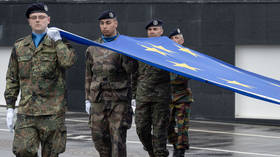The creation of an EU army could be another disastrous outcome of Biden’s Afghan calamity
6 Sep, 2021 11:36

The EU fanatics must have been rubbing their hands with glee when watching the calamity in Kabul unfold on our television screens. Ever on the lookout for opportunities to increase their own powers, they would have realised what was happening in Afghanistan represented a huge opportunity for Brussels to accumulate even more control over its member states.
With the US’ reputation sullied on the world stage, and a president who is viewed as a weak and unreliable ally, the EU is already using the situation to further its own objectives. At a meeting of the bloc’s foreign and defence ministers last week, which was also attended by United Nations and NATO officials, Josep Borrell, the EU’s ‘high representative’ – which really means foreign minister – said, “It’s clear that the need for more European defence has never been as much as evident as today after the events in Afghanistan.”
Borrell argued that, “There are events that catalyse the history…sometimes something happens that pushes the history, it creates a breakthrough and I think the Afghanistan events of this summer are one of these cases.” What Borrell really means is that what has happened in Afghanistan has proven once and for all that that US cannot be relied upon, and the Kabul calamity should be the catalyst for a new EU army.
ALSO ON RT.COMIf EU were a company, its chiefs and CEOs would be in jail - MEPIndeed, it is easy to imagine the private conversations Borrell is already having with the EU’s foreign and defence ministers: “If the US can no longer be trusted, then who is going to protect us, unless we do it ourselves?” And we all know that the answer will be Brussels.
Borrell is certainly not alone in making the arguments for the EU to expand its military capabilities. Claudio Graziano, the chairman of the EU’s military committee also stated that “the situation in Afghanistan, Libya, Middle East, Sahel, show that now it’s the time to act starting with the creation of a rapid European entry force able to show the will of the European Union to act as a global strategic partner. When if not now, later would be late.”
Now I have heard the idea of an EU army bandied around the corridors of Brussels for years. I remember Nigel Farage being told that the notion of such a force was a “dangerous fantasy” back in 2014 by Nick Clegg, the then British deputy prime minister.
It turned out of course to be Clegg who had been engaging in a “dangerous fantasy,” as in 2016 Jean-Claude Juncker, the then head of the EU Commission, announced in the European Parliament that “we have a lot to thank the Americans for… but they won't look after Europe’s security for ever…we have to do this ourselves, which is why we need a new approach to building a European security union with the end goal of establishing a European army.” Now Juncker’s arguments may not have resonated in 2016, but thanks to blundering Biden, it’s a far easier sell now.
ALSO ON RT.COMEU is split on taking Afghan refugees, and it’s hard to blame those who don’t want another mass influxSome EU politicians, such as former Belgian PM Guy Verhofstadt, have been advocating the idea of EU-led militarism for many years now. I remember sitting in the European Parliament in Strasbourg in 2018 when Verhofstadt, the leader of the Liberals in that chamber, told MEPs that the EU required a “strike force,” whilst complaining that “France and the United Kingdom launch missiles. Not the European Union as a whole.”
But the idea of an EU army never truly gained momentum, as the arguments for it were never really that convincing. Opponents of the concept would rightly question the need for an EU army when the US was there to protect Europe. Moreover, Eurosceptics like myself deplored the idea of an EU army because it represented another step towards a United States of Europe, which, after all, is the desired destination of the Brussels fanatics.
Unfortunately, Biden’s Afghanistan debacle has taken away one of the most potent arguments against the creation of an EU army, and you can trust Brussels to make the most of it in the coming months. Indeed, one of the unintended consequences of the catastrophe in Kabul is that it has made Verhofstadt’s pan-European militaristic nightmare all the more realistic.
The statements, views and opinions expressed in this column are solely those of the author and do not necessarily represent those of RT.

0 Comments:
Post a Comment
Subscribe to Post Comments [Atom]
<< Home